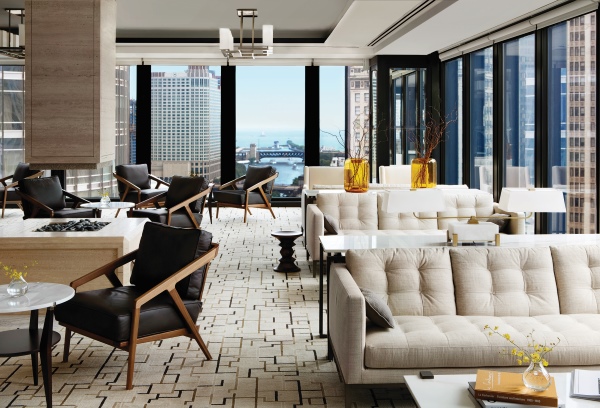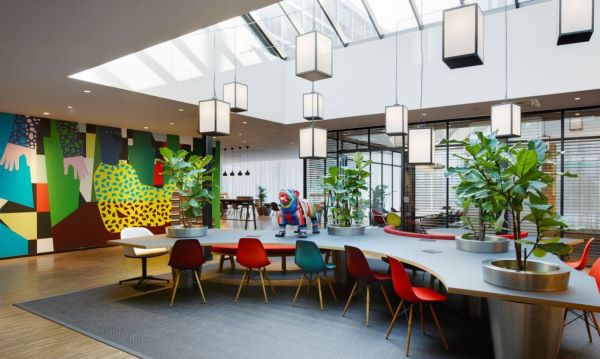Hotels are finding new ways to generate revenue and it’s coming from customers without a room reservation.
A growing number of properties are aiming to entice non-guests, usually local residents, to take advantage of amenities like the pool, fitness center, meeting rooms and more. The goals: revenue generation, exposure to locals and closer connections to the community.
“Multiple opportunities are available,” said Zach Demuth, global head of hotel research for JLL, especially for underutilized city hotels. Though third-party providers have been around for years, offering daytime use of rooms and facilities, new technologies have made it possible to provide direct connections to PMS systems, said Demuth, so that from the minute non-guests arrive, they are treated like guests without hotel staff having to deal with the technology themselves.
These non-guest options mainly involve two possibilities: day passes and memberships. The former involves use of some or all of a property’s facilities and services for a certain number of hours or for a day. The latter involves ongoing use of a specific facility on a weekly, monthly or longer basis.
The highest profile player in the day pass segment is ResortPass which, according to CEO Michael Wolf, works with 1,500 hotels in 27 countries and controls 95% of that market. He said the customer base includes families with children, single young adults, couples and anyone who wants to recharge and rest. And Wolf said that it is not only locals who are targets, but travelers who might be staying with friends and family, or travelers on their way to or from a cruise.

The business model for ResortPass, Wolf said, is that his company gets a commission on the Hotels figured out they were leaving money on the table. Enter the paying non-guest. day-pass charge. ResortPass customers, he added, spend two to three times as much as guests on property because they’re coming to spend the entire day and want to enjoy themselves. He said that 70% of hotels have day passes costing $65 or less. On the other end, luxury brands might offer passes “north of $200.”
ResortPass has partnerships with major brands like Hilton. Jessica Shea, VP of wellness, retail & leisure operations, Americas at Hilton, said, “We see great opportunity to cater to the rapidly expanding segment of individuals seeking daytime hotel and resort visits, particularly with the rise of the day guest for both leisure travelers and locals who may want a quick getaway to relax or recharge.”
The Conrad Los Angeles offers more than 10 different day-pass packages, from rooftop pool access to spa experiences.
Likewise, many Hyatt hotels offer day passes and/or experiential programs, according to Susan Santiago, president, U.S. and Canada at Hyatt Hotels Corp. The company has also collaborated with an experiential technology partner, Way, to make it easier for guests and locals to reserve ancillary experiences.
Since kicking off the pilot in late 2023, participating properties have seen an increase in bookings for these experiences and Hyatt expects to roll out Way to hotels globally as an optional ancillary booking platform, Santiago said.
Examples of Way experiences are: candle crafting, chocolate making and cocktail classes at Thompson Denver, by Hyatt; spa access and yoga classes at Andaz Mexico City Condesa; and a roller-skating fitness class at Chicago Athletic Association, part of The Unbound Collection by Hyatt, which also conducts complimentary guided tours of the historic property.

Fully Operational
Management companies favor day passes, too. Ronald Mader, SVP, full-service and resorts for Hospitality Ventures Management Group, called them “an excellent way to connect with the local community and provide an opportunity for local guests to experience and enjoy the amenities of [a property].”
David Mariotti, divisional VP of operations at Remington Hospitality, which manages the Lakeway Resort and Spa in Texas, said the property partnered with ResortPass in the spring of 2020. Its day-pass program includes access to dining options, a spa, a fitness center and multiple pools. The program, he said, “has significantly increased local engagement, driving awareness and revenue across all channels.”
Sarah Crowe, corporate director, marketing and communications for Twenty Four Seven Hotels, said day-pass programs are “an innovative way to generate ancillary revenue, but they are also a way to engage the local community. Day passes provide locals the opportunity to escape without going away and enjoy hotel facilities with a day-cation.”
Tapping into the growing day-pass market, said Crowe, “has proven to be very successful.” It’s a great way to bridge the gap on lower occupancy days, she added, “and give guests exactly what they want, like a carefree pool day. It also provides a plug-n-play platform to directly reach a qualified audience for special events, such as a Sunday Funday Pool Party.”
Jonathan Knudsen, CEO of Concrete Hospitality Group, which oversees food and beverage at Royalton Park Avenue Hotel in New York, said the property has always offered day passes through its organic channels, website and social platforms. However, after being approached two years ago by ResortPass, “We were convinced their platform was a perfect partner to help spread the word to a wider audience.
“It’s good, qualified revenue,” he continued, “which isn’t always the case,” adding that the partnership allows it to reach a wider audience of potential spenders.
The Royalton, said Knudsen, has increased ResortPass bookings by nearly 50% when comparing June 2023 to June 2024, and revenue from these bookings has increased by 80% over that same period.
Some hotels go at it alone on the non-guest front. For instance, The Langham, Chicago offers a Club Lounge Day Pass to the 4,000-square-foot Langham Club Lounge on the 12th floor with panoramic views of the city and value-adds including workspaces and boardroom use, multiple F&B presentations throughout the day and personalized concierge services.
Megan Brilley, director of public relations, called the initiative a great success, allowing the hotel to offer guests and non-guests “a luxury, remote space while also showcasing what we’re all about, which is providing our community with the highest standard of hospitality.”
CitizenM, a boutique hotel group, has not only shied away from memberships, it’s embraced them, offering a membership program across its 34 hotels worldwide. For a nominal monthly or annual fee, CitizenM provides 15% off all stays, free welcome drink with app bookings, early access to sales, free late checkout, free premium view (at hotels with premium view), 15% off food and drink (except breakfast), guaranteed room (48 hours’ notice), 15% off meeting rooms and recently added free use of co-working spaces.

Guest Impact
Hotels must take care to not allow non-guests to impact the paying-guest experience, but as Demuth noted, “You won’t be able to book a pool cabana at a Ritz-Carlton resort on a July 4th weekend because you risk alienating guests.”
“We never compromise the overnight guest experience,” said Wolf. “The reality is that there is excess capacity. Even when a hotel is sold out for a conference, the rooftop pool might be empty. In Los Angeles, when a hotel is at 95% occupancy, the pool might be empty during the day.”
ResortPass, one could argue, is akin to an OTA, in some regards: hoteliers can use it when they need to. “It allows hotels to ‘turn on’ ResortPass offers when the hotel occupancy may be lower and the hotel’s amenities are expected to be available,” Shea said, allowing that the offerings can then be turned off during times of higher occupancy and utilization to give priority to hotel guests.
Optimizing Opportunities
Pools and cabanas are the “lead-in” for non-guest business, according to Demuth, but he believes there is monetization opportunity beyond that. Meeting space, he said, is so underutilized, with many hotels having three or four boardrooms that can hold as many as eight people. The same can be said for co-working spaces and even, in some cases, parking, because hotels own their own garages, which is valuable real estate.
There are many untapped opportunities for these products, said Wolf, even events like hotel movie nights and other one-time occasions. ResortPass, he said, helps hotels customize their offerings. While there are some programs that limit the number of hours or even a single fitness class, most access is for the entire day.
From JLL’s perspective, Demuth asked, “Will a major brand realize they can do this themselves?” He isn’t convinced since brands mostly stick with their core competency. From the hotel perspective, he continued, their best guest is still the overnight guest. “Hotels are in the business of being hotels,” he said, “so this will always be an add-on or an ancillary product.”
Story contributed by Harvey Chipkin.
